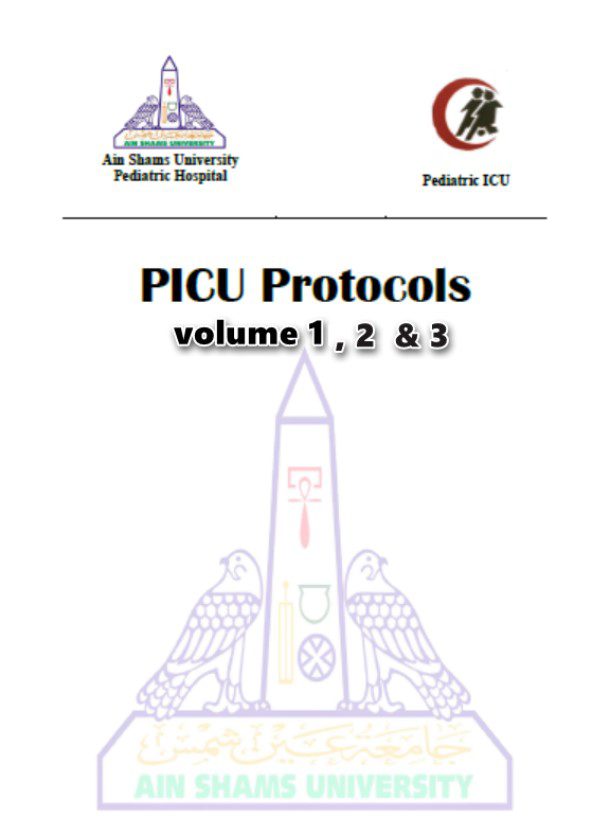Download Ain Shams University PICU protocols (volume 1, 2 & 3 in one pdf) complete protocol Free
Guidelines for student/resident/fellow coverage in the Pediatric Intensive Care Unit
Purpose of Guideline:
To clarify issues relating to patient care coverage and work for the various care providers in the PICU
Caregivers in the PICU and level of responsability
1.Attending coverage
a.Day attending: Primary attending or consulting/co-attending on all pediatric patients and selected adult patients admitted to the PICU
b.Backup attending: A backup attending is available during the day and is called at the discretion of the day attending
c.Night attending: Night attending for admission, cross coverage, transport calls/consults, code team response.
d.Sedation attending: Available some days
2.Resident Coverage
a.Pediatric residents: PL2 and PL3. Residents each take patients primarily. PL3 should strive to mentor and guide the PL2 as needed with PICU or hospital procedures.
b.Emergency Medicine Intern. The EM intern will take patients primarily. Not all months have an EM intern.
3.Fellow Coverage (varies by month)
a.PICU Fellow. The PICU fellow will act in a supervisory capacity, under the direction of the PICU attending, for all patients admitted to the PICU.
b.Cardiology Fellow. The cardiology fellow will act in a supervisory capacity, under the direction of the PICU attending, for all cardiology or cardiac surgery patients admitted to the PICU. The cardiology fellow may go to the cath lab or OR for optimal educational experiences.
c.Anesthesia Fellow. The anesthesia fellow will take patients primarily along with the Pediatric residents and EM intern.
d.Surgical Fellow. The role/responsibilities of the surgical fellow will vary depending on their educational goals.
4.Students
a.Subintern (MS4). The subintern will follow patients as the primary caregiver. One of the pediatric residents should be assigned to “back-up” the subintern on each patient.
b.Student (MS3). The student will follow patients as the primary caregiver. One of the pediatric residents (generally the PL3) should be assigned to follow the patient along with the student. (see student info page for more specific guidelines re MS3 experience)
Responsibilities of Primary Resident/student:
1.Write admission orders and admission note (medical patient) or review admission orders and write admission note (surgical patient)
2.Pre-round on patients and be prepared to present on rounds. (note, residents should not pre-round on subintern patients, and should very briefly pre-round on MS3 patients)
3.Write daily notes. Surgical patients do not need notes on the day of transfer (except cardiac surgical patients, who transfer to the cardiology service on the ward/dncc).
4.When gone from unit (post call, clinic, etc), communicate/sign out with resident/s who remain in the unit. Please also notify the attending that you are leaving and summarize any patient care tasks that still need to be done.
5.Write transfer note for medical patients, communicate patient data to receiving resident.
6.For Shriner’s discharges or home discharges, dictate admission (students should not dictate).
Division of Patients:
1.Pediatric PL2, Pediatric PL2, EM PL1, sub-intern, and anesthesia fellow will take patients primarily
2.The above caregivers will distribute patients relatively evenly, within the following guidelines
a.The EM intern and pediatric sub-intern should take more straightforward medical and surgical patients until he/she is comfortable with taking more difficult patients. They should follow up to 3-4 patients
b.The anesthesia fellows generally do not have substantial pediatric experience, and usually are not familiar with “how to get things done” at OHSU. Because of this, initially they should have fewer patients so that they can familiarize them selves with the various hospital/unit procedures. They should follow up to 3-4 patients.
c.The Pediatric PL2 and PL3 should follow up to 5 high-acuity (nursing acuity 6 or 7) or a maximum of 8 patients primarily. Some of these patients will also be followed by a MS3.
d.The Sub-intern should follow 1-3 patients (backed-up by one of the pediatric residents)
e.The MS3 should follow 1-3 patients (co-followed with Pediatric resident)
3.Patients admitted by the cross cover residents should be divided up the following day, with attention to evening up the distribution of patients according to the above guidelines.
Download Ain Shams University PICU protocols (volume 1, 2 & 3 in one pdf) complete protocol Free

File Size: 9.3 MB
You may also be interested in:
Handbook of Pediatric Neurosurgery 1st Edition 2018 Download PDF (Free Book)
In this part of the article, you will be able to access the .pdf file of Ain Shams University PICU protocols (volume 1, 2 & 3 in one pdf) complete protocol PDF Free EBook by using our direct links. We have uploaded Ain Shams University PICU protocols (volume 1, 2 & 3 in one pdf) complete protocol to our online repository to ensure ease-of-access and safety.
Please use the download link mentioned below to access Ain Shams University PICU protocols (volume 1, 2 & 3 in one pdf) complete protocol Free EBook.
Disclaimer:
This site complies with DMCA Digital Copyright Laws.Please bear in mind that we do not own copyrights to this book/software. We’re sharing this with our audience ONLY for educational purpose and we highly encourage our visitors to purchase original licensed software/Books. If someone with copyrights wants us to remove this software/Book, please contact us immediately.
You may send an email to admin@cmecde.com or adcmecde@gmail.com for all DMCA / Removal Requests.